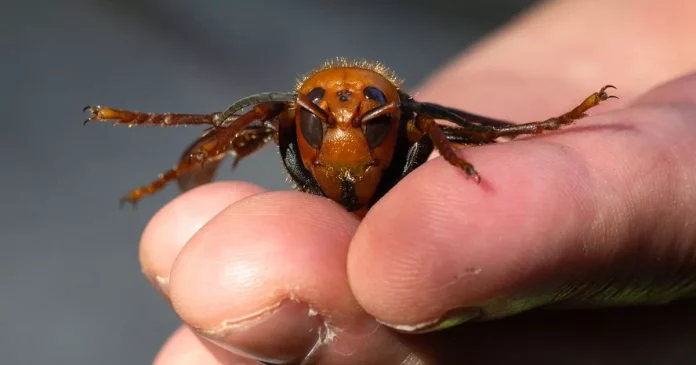Scientists have issued a warning as menacing Asian Hornets start to come out of hibernation – sharing crucial information on what people should do if they spot one. The invasive insects are known for killing honey bees and putting the species’ survival at risk.
The dangerous yellow-legged hornets typically start to emerge from hibernation this month but several were already spotted in the UK as early as January this year. The non-native Asian Hornet, which is twice the size of a normal wasp and is believed to be able to kill around 50 bees a day, poses a huge threat to the critical pollinators.
The Asian Hornet hovers outside beehives for long periods in order to catch and kill honey bees. And experts at GardeningExpress have revealed the key steps Brits need to take if they spot one.
Firstly, people must remain calm and try not to aggravate the insect, especially if they’re at risk of experiencing an allergic reaction from a sting. GardeningExpress founder Chris Bonnett said: “Similar to regular hornets, their sting can cause some severe pain and some people may even suffer from an allergic reaction which can lead to swelling and difficulty breathing.”
He also explained what people should do if they are stung by one of these flying menaces, saying: “It’s likely they will only sting you if aggravated, if this does happen, ask someone to help you seek medical attention. You’ll also want to immediately rinse the area with warm soapy water and apply ice. This will help slow down the spread of the venom.”
Bonnett added: “They do not leave behind a stinger so don’t worry about having to remove anything from the skin.” The expert also shared that people can report any sightings of these dangerous hornets on an app called Asian Hornet Watch.
This warning comes after scientists revealed they have developed a way to identify the sound of the hornets. Researchers from Nottingham Trent University have been able to pinpoint Asian Hornets by their hovering flight sounds.
They made the important discovery using inexpensive microphones and an algorithm made to distinguish the hornets’ sounds to the crucial honey bee. Scientists have hoped this technology could allow beekeepers to spot the deadly Asian Hornets using their phones, to protect their colonies.
Asian Hornets have been breaking unwanted records by appearing earlier than ever before in the UK. The earliest they were seen before 2025 was March 11, but the record was smashed this year when one was captured on January 25 in Oswestry, Shropshire.
They are typically spotted flying across Kent and the English Channel in the summer months but worrying DNA analysis has revealed the hornets might now be able to survive British winters.
At Reach and across our entities we and our partners use information collected through cookies and other identifiers from your device to improve experience on our site, analyse how it is used and to show personalised advertising. You can opt out of the sale or sharing of your data, at any time clicking the “Do Not Sell or Share my Data” button at the bottom of the webpage. Please note that your preferences are browser specific. Use of our website and any of our services represents your acceptance of the use of cookies and consent to the practices described in our Privacy Notice and Cookie Notice.


